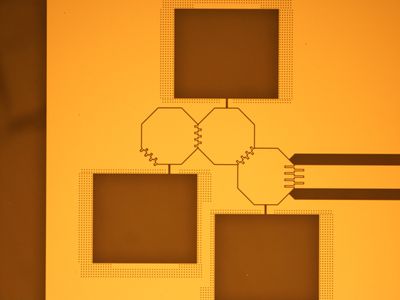The course consists of lab modules that will demonstrate different aspects of quantum technology.
Each lab module will be organized by and conducted at different research groups in the Department of Applied Physics.
SK2903 Quantum Technology 7.5 credits

A superconducting microwave circuit with several resonant modes around 10 GHz. When cooled to very low temperatures the microwave circuit exhibits quantum behavior. Josephson junctions are used as nonlinear elements to couple the modes and allow for creation of entangled states.
Information per course offering
Information for Autumn 2026 Start 24 Aug 2026 programme students
- Course location
AlbaNova
- Duration
- 24 Aug 2026 - 11 Jan 2027
- Periods
Autumn 2026: P1 (3 hp), P2 (4.5 hp)
- Pace of study
25%
- Application code
51028
- Form of study
Normal Daytime
- Language of instruction
English
- Course memo
- Course memo is not published
- Number of places
Places are not limited
- Target group
- No information inserted
- Planned modular schedule
- [object Object]
- Schedule
- Part of programme
Contact
Course syllabus as PDF
Please note: all information from the Course syllabus is available on this page in an accessible format.
Course syllabus SK2903 (Autumn 2025–)Content and learning outcomes
Course contents
Intended learning outcomes
After completing the course, the student should be able to:
- Explain the how measurements in the laboratory are related to calculations in the theory of quantum mechanics.
- Explain quantum entanglement and how it can be used to create physical correlations between observable quantities.
- Demonstrate the ability to acquire data with advanced laboratory instruments in a research environment.
- Demonstrate the ability to analyze experimental data and present the results with publication-quality graphical figures.
- Demonstrate the ability to write a clear, concise and correct scientific text.
Literature and preparations
Specific prerequisites
At least 120 credits in engineering and natural sciences and knowledge of English B or equivalent.
Literature
Examination and completion
Grading scale
Examination
- LABQ - Laboratory work, 7.5 credits, grading scale: A, B, C, D, E, FX, F
Based on recommendation from KTH’s coordinator for disabilities, the examiner will decide how to adapt an examination for students with documented disability.
The examiner may apply another examination format when re-examining individual students.
If the course is discontinued, students may request to be examined during the following two academic years.
The examiner, in consultation with the KTH Disability Coordinator (Funka), decides on any adapted examination for students with documented permanent impairment. The examiner may grant another examination form for reexamination of single students.
Other requirements for final grade
All laboratory work approved (LAB1 - LAB5; 1.5 credits per lab).
Examiner
Ethical approach
- All members of a group are responsible for the group's work.
- In any assessment, every student shall honestly disclose any help received and sources used.
- In an oral assessment, every student shall be able to present and answer questions about the entire assignment and solution.